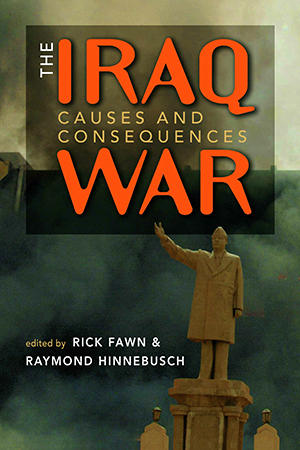While the war in Afghanistan saw most industrial countries back the US-led campaign, the subsequent war in Iraq profoundly divided international opinion—and likely represents a watershed in the post-Cold War international order.
The Iraq War examines the full range of explanations of the conflict, as well as its significance for the Middle East, for key international relationships, and for the future of the international system.
The authors critically assess the foreign-policy decisions of both global and regional actors. What policies were adopted, and against what opposition? What state interests were served or compromised in the process? What are the likely longer-term consequences of each country's position? Addressing these questions, as well as broader issues of regional stability, global political economy, and the changing nature of warfare, they offer an in-depth, systematic analysis that brings clarity to this complex subject.
Rick Fawn is senior lecturer in international relations at the University of St Andrews. His publications include Global Responses to Terrorism: 9/11, the War in Afghanistan, and Beyond. Raymond Hinnebusch is professor of international relations and Middle East politics at the University of St. Andrews. He is author, most recently, of The International Politics of the Middle East and Syria: Revolution from Above and coeditor of The Foreign Policies of Middle East States.
The Middle East in the International System"A most welcome investigation.... It will enrich university courses treating the war, as well as more general courses on war and diplomacy."—William E. Odom, International Journal of Middle East Studies
"Lucidly informs in a manner that will not date.... This book will remain a valuable guide for some years to come."—Paul Rogers, Political Studies Review
"Offers one of the best assessments in print.... A 'must' for any who would truly understand underlying motivations and forces in the region."—Midwest Book Review
"This is a treasure-trove of a book. It provides a comprehensive analysis of the policies of the major international and regional states leading up to the war, as well as the immediate consequences, and at the same time relates this analysis to broader issues in international law, foreign policy, and international relations theory. It sets a standard to which all subsequent discussion, in public policy debates and in academic analysis, will have to refer."—Fred Halliday, London School of Economics and Political Science
"This is the first comprehensive study of the recent war in Iraq and its probable consequences. Both evaluating what occurred and situating it within the dominant IR discourses, it is an invaluable resource."—George Joffé, Lecturer and Research Fellow, Centre of International Studies, University of Cambridge.
"Comprehensive, timely, and well written.... I recommend it highly."—Mary Ann Tétreault, Trinity University






